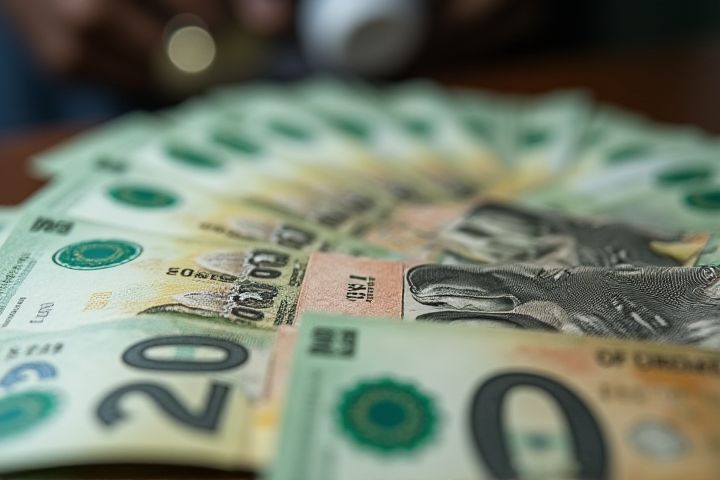
Currency exchange in Nigeria plays a crucial role in facilitating international trade and travel. The Nigerian Naira (NGN) is the official currency, and its exchange rates fluctuate based on market dynamics, government policies, and global economic trends. Forex trading is mainly conducted through authorized banks and licensed forex dealers, where you can exchange Naira for foreign currencies like the US Dollar (USD) and Euro (EUR). You'll find that the Central Bank of Nigeria (CBN) regulates the forex market to ensure stability, while sometimes implementing measures to manage currency demand. Understanding the current exchange rates and market conditions will empower you to make informed decisions when exchanging currency in Nigeria.
Naira is Nigeria's official currency.
Currency exchange in Nigeria revolves around the Naira (NGN), which serves as the nation's official currency. The Central Bank of Nigeria regulates exchange rates, influencing both domestic and international transactions. Multiple platforms, including banks and authorized exchange bureaus, offer varying rates for converting Naira to foreign currencies such as the US Dollar (USD) and Euro (EUR). Understanding the complexities of currency exchange in Nigeria is crucial for businesses and travelers to maximize their financial transactions.
Central Bank regulates foreign exchange.
Currency exchange in Nigeria is primarily regulated by the Central Bank of Nigeria (CBN), which implements policies to stabilize the naira and manage foreign exchange reserves. The CBN establishes the official exchange rates and oversees the foreign exchange market to prevent volatility and ensure fair trading practices. Major currencies traded include the US dollar, euro, and British pound, impacting trade and investment opportunities. For individuals looking to exchange currency, it is essential to stay informed about the latest CBN policies to maximize the value of your transactions.
Bureaux de Change for cash transactions.
Bureaux de Change in Nigeria serve as crucial intermediaries for currency exchange, allowing individuals and businesses to convert foreign currencies to Nigerian Naira and vice versa. These establishments typically offer competitive exchange rates and immediate cash transactions, catering to tourists and local residents alike. Licensed by the Central Bank of Nigeria, Bureaux de Change must adhere to regulatory standards, ensuring a secure and transparent exchange process. When engaging in currency exchanges, consider factors such as fees, compliance with anti-money laundering regulations, and the credibility of the Bureaux de Change to safeguard your financial interests.
Parallel market exists for currency trade.
In Nigeria, the parallel market for currency exchange plays a significant role in the economy, often providing more favorable rates compared to the official market. This unregulated exchange landscape allows individuals and businesses to buy and sell foreign currencies such as the US dollar or euro, reflecting real market demand and supply. Many Nigerians turn to these unofficial channels to circumvent stringent regulations and access the necessary foreign currency for imports, travel, or investment. Understanding the intricacies of this parallel market is crucial for anyone involved in currency trade within Nigeria's dynamic economic environment.
Exchange rates can be volatile.
Currency exchange rates in Nigeria are subject to significant volatility, influenced by factors such as economic stability, inflation rates, and geopolitical events. The Central Bank of Nigeria (CBN) plays a crucial role in regulating these rates, implementing measures to stabilize the Naira against major currencies like the US Dollar and Euro. Market dynamics, including supply and demand, can lead to fluctuations that affect your purchasing power or investment in foreign markets. Understanding these trends is essential for individuals and businesses engaging in foreign exchange transactions to mitigate risks and make informed financial decisions.
Restrictions on foreign currency withdrawal.
In Nigeria, currency exchange practices are heavily influenced by government restrictions on foreign currency withdrawals. The Central Bank of Nigeria (CBN) has implemented measures to limit access to foreign currencies, affecting businesses and travelers alike. These restrictions aim to stabilize the Nigerian naira by curbing capital flight and ensuring a steady supply of foreign currency for essential imports. Understanding these regulations is crucial for anyone engaging in currency exchange, as it directly impacts your financial transactions and planning.
Dual exchange rate system in place.
Nigeria's currency exchange operates under a dual exchange rate system, distinguishing between official and parallel market rates. The Central Bank of Nigeria (CBN) sets the official rate, aimed at stabilizing the Naira and controlling inflation, while the parallel market reflects real-world supply and demand. This system can create discrepancies, impacting import costs and foreign investments. As a result, individuals and businesses must navigate these varying rates to optimize their financial transactions.
Online platforms for currency trading.
In Nigeria, online platforms for currency exchange have revolutionized how individuals and businesses engage in foreign exchange (Forex) trading. These digital platforms offer real-time market access, allowing users to buy and sell foreign currencies seamlessly with competitive rates. Security features, like two-factor authentication and encryption, enhance user trust during transactions. Embracing these online solutions can significantly impact your financial strategies, providing opportunities for profit in a global market.
Identification needed for large transactions.
In Nigeria, currency exchange regulations require strict identification verification for large transactions exceeding specified thresholds. Typically, you must present a valid government-issued ID, such as an international passport or national driver's license, along with proof of residence, like a utility bill or bank statement. Additionally, financial institutions may request a Tax Identification Number (TIN) to ensure compliance with local tax laws and anti-money laundering regulations. Understanding these requirements is crucial for a smooth currency exchange process, especially when dealing with significant amounts.
Currency black market risks.
Currency exchange in Nigeria often involves navigating the risks associated with the black market, where the naira is traded at significantly higher rates than official channels. Engaging in black market transactions exposes you to potential fraud, as unregulated dealers may provide counterfeit currency or fail to deliver agreed amounts. Economic instability and government interventions can further complicate these exchanges, leading to sudden fluctuations in value. Awareness of these risks is crucial for anyone looking to engage in currency exchange within Nigeria's complex financial landscape.
